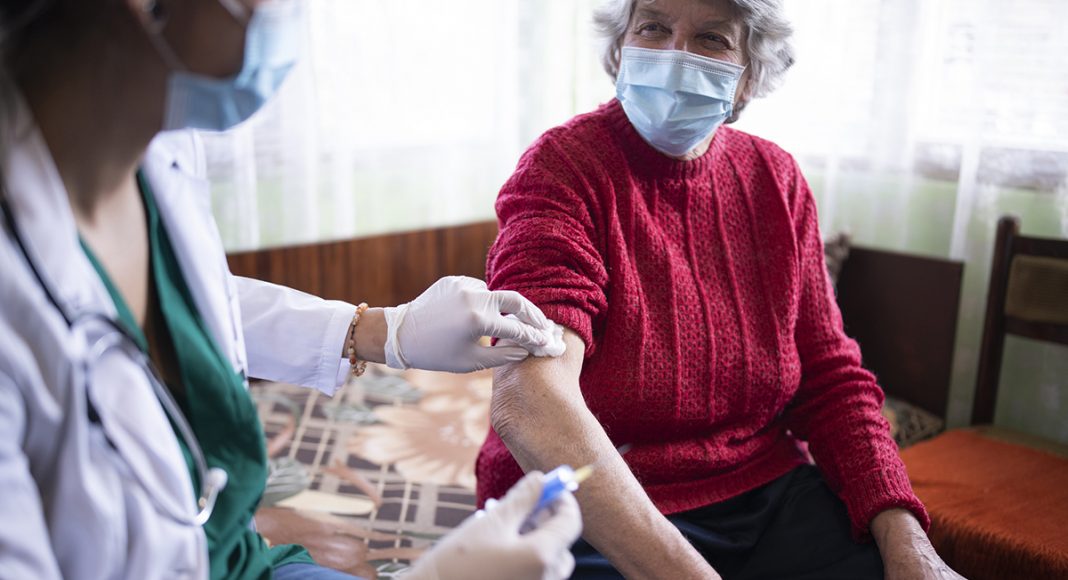Recent data from the Financial Trust Index (FTI) reveals that Americans are not as willing to be vaccinated as the government expects. Trusting doctors and being afraid of the disease are by far the largest determinants of people’s willingness to be vaccinated.
On January 26, barely a week into his presidency, President Joe Biden announced the purchase of 200 million additional vaccine doses and promised to increase the distribution of vaccines to individual states. The new administration hopes that the increased supply would allow almost the entire US population, about 300 million people, to be vaccinated by early fall. While the vaccine supply problem might have been resolved, research indicates that convincing enough Americans to get vaccinated will be the real challenge.
Recent data from the Financial Trust Index (FTI), administered by the University of Chicago Booth School of Business and Northwestern University’s Kellogg School of Management, reveals that Americans are not as willing to be vaccinated as the government expects. The FTI, created in 2008 to measure the overall level of trust in American institutions, found that about one third of Americans, at 32 percent, are hesitant to get vaccinated. These results confirm and reinforce previous findings by the Axios/Ipsos and the Pew Research Center, showing that large numbers of Americans were unwilling to get the vaccine.
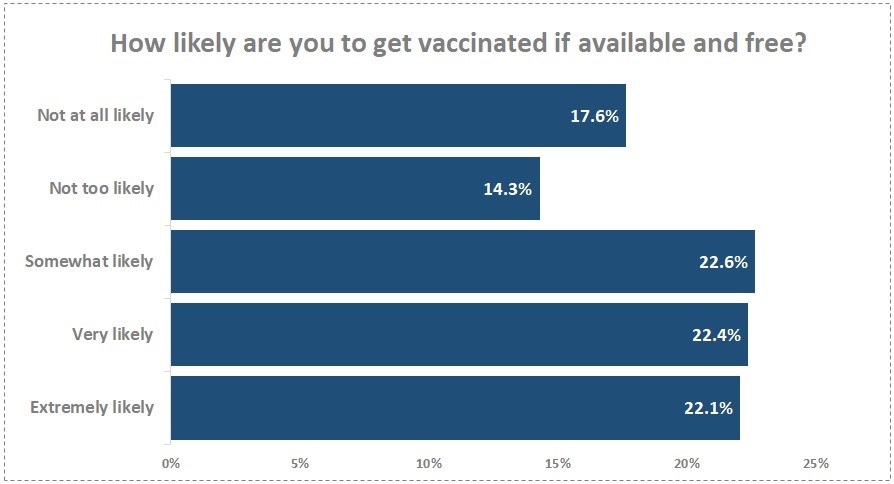
‘If the coronavirus vaccine is available and free to everyone who wants it, how likely
are you to get vaccinated in the next three to six months?’ A total of 1,010 people
were surveyed between December 21-29, 2020.
The FTI data, however, allows us to explore some reasons behind the observed behavior. Our analysis shows that the largest determinants of people’s willingness to be vaccinated are their fear of contracting Covid-19 and their trust in doctors. To be precise, we found that being afraid of the virus increases people’s likelihood of getting the vaccine by up to 40 percent. Similarly, if a person trusts their doctor, they are up to 20 percent more likely to get the vaccine. These results persist even after considering characteristics such as age, gender, race, education, and political affiliation of the respondent.
The FTI data further reveals alarming contrasts between different groups of people based on race and gender, education, and political affiliations. Approximately 22.7 percent of Hispanic respondents and 21.3 percent of Black respondents replied that they were not at all likely to get the vaccine, while only 13.2 percent of white respondents replied the same. This contrast is especially concerning given the disproportional impact of the pandemic on minority groups. Lastly, our analysis shows that Black respondents and female respondents are 7.7 percent and 6.4 percent less willing to get the vaccine, respectively. The observed lower predisposition to getting vaccinated persists even after we account for education, trust in doctors, government, and other people in general, indicating that there are other factors behind their hesitation.
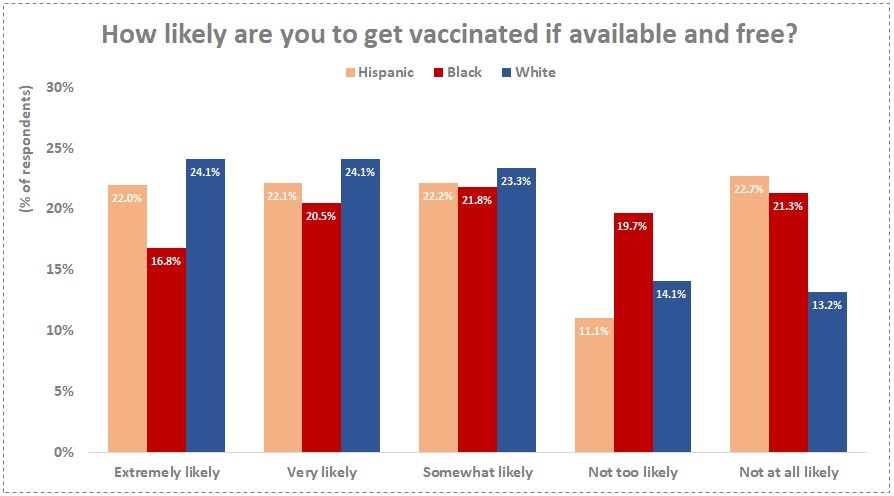
Figure 2. This chart shows the share of respondents by race/ethnicity who answered the following survey question: ‘If the coronavirus vaccine is available and free to everyone who wants it, how likely are you to get vaccinated in the next three to six months?’ A total of 920 people answered this question and reported their race/ethnicity – white (n = 767), Black (n = 63), and Hispanic (n = 102).
When it comes to political affiliation, about 19.4 percent of Republicans and 27 percent of independents responded that they are not at all likely to get vaccinated. In comparison, only 6.9 percent of Democrats responded the same. In fact, we found that Republicans are about 4.7 percent less likely to get the vaccine. This reluctance could be due to the continuous downplaying of the pandemic by Republican lawmakers.
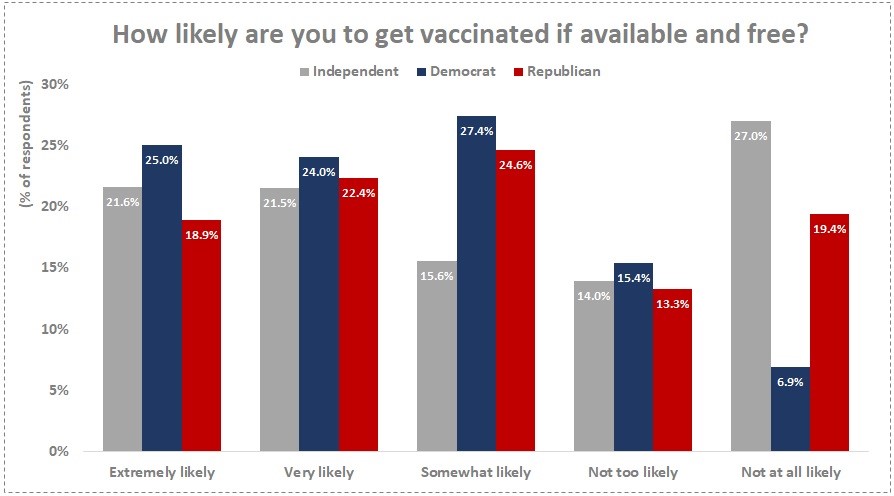
Figure 3. The chart shows the share of respondents by political affiliation who answered the following survey question: ‘If the coronavirus vaccine is available and free to everyone who wants it, how likely are you to get vaccinated in the next three to six months?’ A total of 985 people answered this question and reported their political affiliation – Republican (n = 315), Democrat (n = 370), and Independent (n = 300).
Finally, we also find that more educated people are more likely to want the vaccine vis-à-vis their peers with at most a high school degree. To be precise, people with at most a high school degree are about 7.6 percent less likely to want to get immunized.
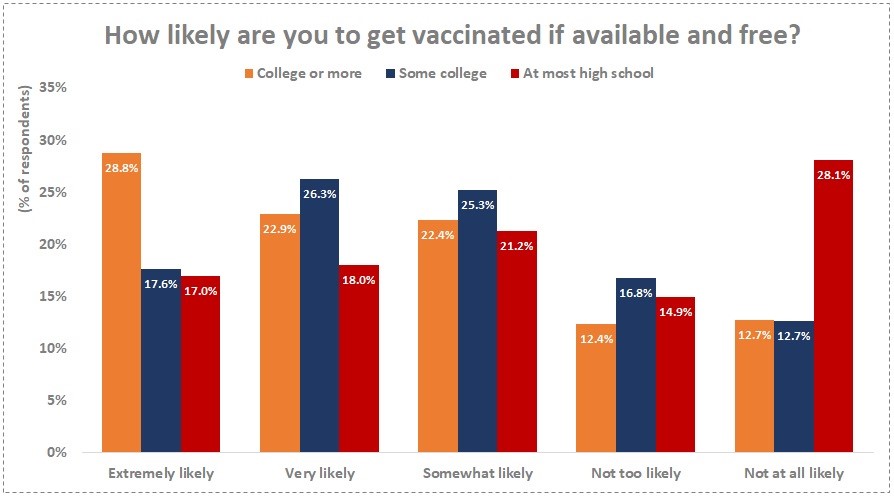
The current lack of interest in getting vaccinated represents a severe problem for the country, as it prevents it from returning to anything resembling normal. In a recent interview with CNN, Dr. Anthony Fauci, the director of the National Institute of Allergy and Infectious Diseases, said that in order for the US to return to normal, between 70 and 85 percent of Americans would need to be fully vaccinated.
As it stands, the federal government may have guaranteed enough vaccinations to achieve herd immunity, but it will be in vain if people are unwilling to get immunized. If the government wants to succeed, it has to increase Americans’ trust in healthcare professionals and ensure that the dangers of the pandemic are not downplayed. Further research is also needed to better understand the remaining reasons behind specific segments of the population’s unwillingness to get the vaccine, so that we can properly address them and not leave anyone behind.





